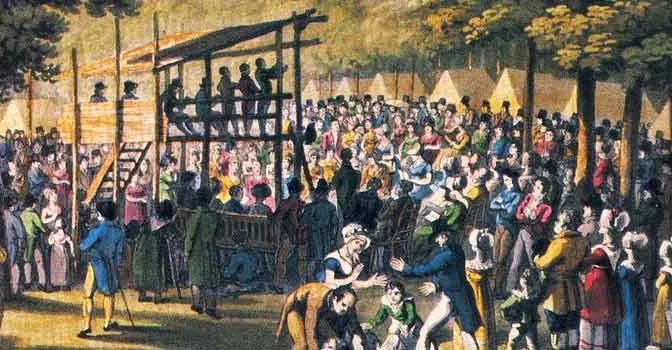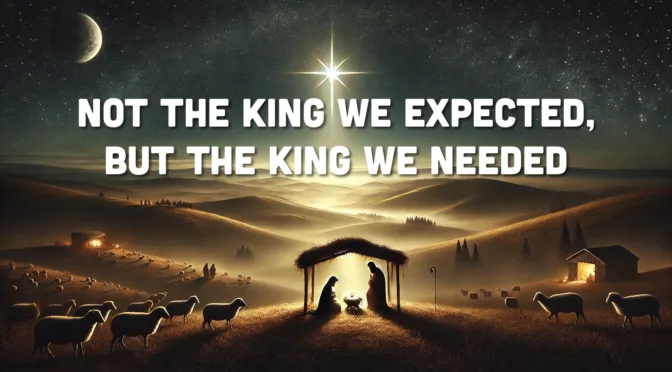In the early 1800s, America was a nation in transition, grappling with rapid social, economic, and territorial changes. Amid this turbulence, a fire of spiritual renewal swept across the land, known as the Second Great Awakening. This revival profoundly shaped the spiritual and social fabric of the United States, leaving a legacy that resonates even today.
Unlike the localized revivals of earlier movements, the Second Great Awakening spread across vast regions, from rural camp meetings in Kentucky to urban churches in New England. At its core was a call to repentance, a renewed focus on salvation, and a fervent desire to see lives and communities transformed by the power of the Gospel. However, not every region welcomed this fire of spiritual renewal with open arms. Worcester, Massachusetts, for instance, became known for its resistance to revivalist preachers, reflecting a tension between traditional rationalist views and the emotional fervor of revivalist preaching.
A Movement Rooted in Prayer
The Second Great Awakening began quietly in small gatherings of believers who sought God through persistent prayer. In rural areas, Christians met in homes and barns, crying out for a fire of spiritual renewal. These gatherings often sparked larger meetings, where preachers would proclaim the Gospel with urgency and zeal.
This aligns with the biblical principle found in 2 Chronicles 7:14: “If My people, who are called by My name, humble themselves, and pray and seek My face and turn from their wicked ways, then I will hear them from heaven and forgive their sin and heal their land” (AMP). The awakening began with humble hearts seeking God, and He responded mightily, igniting a fire of spiritual renewal that could not be extinguished.
Even in places like Worcester, where resistance to revivalism was strong due to the dominance of Unitarian and rationalist influences, prayer and persistence paved the way for the spread of this fire of spiritual renewal in surrounding areas. Though some preachers were kept out, the flames of the revival could not be contained entirely.
Camp Meetings and Fiery Preaching
One of the hallmarks of the Second Great Awakening was the rise of camp meetings, especially in the frontier regions of Kentucky and Tennessee. These outdoor gatherings often lasted for days, drawing thousands of people hungry for a fire of spiritual renewal. Preachers like James McGready and Barton Stone delivered passionate sermons, calling sinners to repentance and believers to deeper faith.
These meetings reflected the urgency of Romans 10:14: “How then will they call on Him in whom they have not believed? And how will they believe in Him of whom they have not heard? And how will they hear without a preacher?” (AMP). The preaching in these settings brought the message of salvation to countless people who might not have heard it otherwise, fueling the fire of spiritual renewal.
In contrast, urban centers like Worcester resisted the emotional style of camp meetings. Many viewed such gatherings as disruptive and overly emotional. This resistance, however, highlights the cultural and spiritual battle lines drawn during the awakening, as revivalists sought to spread the fire of spiritual renewal to both the spiritually complacent and the unchurched.
A New Emphasis on Personal Responsibility
The Second Great Awakening differed from earlier revivals in its emphasis on personal responsibility in responding to the Gospel. Preachers like Charles Finney, who became a leading figure in the movement, stressed that individuals could make the choice to repent and follow Christ. Finney’s “new measures” included altar calls and public invitations for people to come forward and commit their lives to Christ.
Finney’s theology aligned with the call in Acts 3:19: “So repent [change your inner self—your old way of thinking] and return [to God], so that your sins may be wiped away, [blotted out, completely erased], so that times of refreshing may come from the presence of the Lord” (AMP). His sermons stirred hearts and made repentance accessible to all, igniting a fire of spiritual renewal even in areas where resistance to change remained strong.
Impact on Society
The Second Great Awakening extended beyond personal salvation to societal transformation. It inspired the establishment of missionary societies, Sunday schools, and Bible distribution efforts. It also played a significant role in major social reform movements, including abolition, women’s rights, and temperance. Believers, transformed by the Gospel, sought to live out their faith by addressing injustices and meeting the needs of their communities. This fire of spiritual renewal burned brightly, leading to tangible changes in society.
Even in Worcester, where revivalists faced barriers, the awakening’s emphasis on social reform found traction. Organizations aimed at combating slavery and supporting education reflected the broader influence of this revivalist wave. The fire of spiritual renewal was not confined to revival meetings but extended into every corner of American life.
This revival demonstrated that true faith is not confined to private worship but influences the public sphere. As James 2:26 reminds us, “For just as the body without the spirit is dead, so also faith without works is dead” (AMP).
A Legacy of Renewal
By the mid-19th century, the Second Great Awakening had touched every corner of American society. Entire towns and cities were transformed as individuals came to faith, churches grew, and believers sought to live out the Gospel in every aspect of their lives. Even in places like Worcester, where resistance to revival was strong, the movement’s influence could not be ignored.
The awakening’s emphasis on prayer, preaching, personal responsibility, and societal change continues to inspire Christians today. It reminds us that revival begins when ordinary people, filled with the Spirit, seek God with all their hearts and proclaim His truth boldly, spreading a fire of spiritual renewal wherever they go.
Prayer for Awakening
Heavenly Father, we thank You for the testimony of the Second Great Awakening and the lives transformed through prayer, repentance, and bold preaching. Stir our hearts to seek You with that same passion today. Let Your Spirit move in our homes, churches, and communities, bringing a fire of spiritual renewal that glorifies You and transforms lives. In Jesus’ name, Amen.


